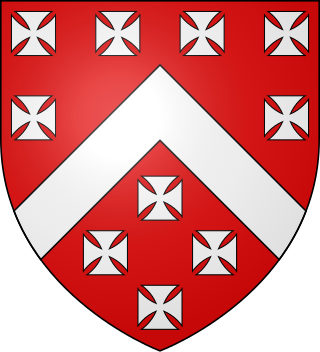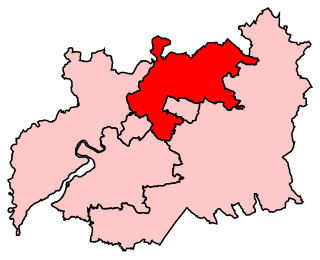
The title Baron Berkeley originated as a feudal title and was subsequently created twice in the Peerage of England by writ. It was first granted by writ to Thomas de Berkeley, 1st Baron Berkeley (1245–1321), 6th feudal Baron Berkeley, in 1295, but the title of that creation became extinct at the death of his great-great-grandson, the fifth Baron by writ, when no male heirs to the barony by writ remained, although the feudal barony continued. The next creation by writ was in 1421, for the last baron's nephew and heir James Berkeley. His son and successor William was created Viscount Berkeley in 1481, Earl of Nottingham in 1483, and Marquess of Berkeley in 1488. He had no surviving male issue, so the Marquessate and his other non-inherited titles became extinct on his death in 1491, whilst the barony passed de jure to his younger brother Maurice. However, William had disinherited Maurice because he considered him to have brought shame on the noble House of Berkeley by marrying beneath his status to Isabel, daughter of Philip Mead of Wraxhall, an Alderman and Mayor of Bristol. Instead, he bequeathed the castle, lands and lordships comprising the Barony of Berkeley to King Henry VII and his heirs male, failing which to descend to William's own rightful heirs. Thus on the death of King Edward VI in 1553, Henry VII's unmarried grandson, the Berkeley inheritance returned to the family. Therefore, Maurice and his descendants from 1492 to 1553 were de jure barons only, until the return of the title to the senior heir Henry, becoming de facto 7th Baron in 1553. Upon his death he was succeeded by his relative George Harding.
This is a list of people who have served as Lord Lieutenant of Gloucestershire. Since 1694, all the Lord Lieutenants have also been Custos Rotulorum of Gloucestershire.

Gloucester is a constituency centred on the cathedral city and county town of the same name, represented in the House of Commons of the UK by Alex McIntyre of the Labour Party

Tewkesbury is a constituency in Gloucestershire represented in the House of Commons of the UK Parliament since 2024 by Cameron Thomas, a Liberal Democrat.

Colonel Norborne Berkeley, 4th Baron Botetourt, commonly referred to as Lord Botetourt, was a British peer, Tory politician, military officer and colonial administrator who served as the governor of Virginia from 1768 to 1770, when he died in office.

Baron Botetourt is an abeyant title in the Peerage of England. It was created by writ of summons on 19 June 1305. It became abeyant in 1406, but was recalled from abeyance in 1764 for Norborne Berkeley. However, it became abeyant again on his death in 1770. It was recalled a second time in 1803 for the 5th Duke of Beaufort, and became a subsidiary title of the dukes of Beaufort until the death of the 10th Duke in 1984, when it became, and remains, abeyant.

The Berkeley family is an ancient English noble family. It is one of only five families in Britain that can trace its patrilineal descent back to an Anglo-Saxon ancestor. The Berkeley family retains possession of much of the lands it held from the 11th and 12th centuries, centred on Berkeley Castle in Gloucestershire, which still belongs to the family.
This is a list of Sheriffs and High Sheriffs of Gloucestershire, who should not be confused with the Sheriffs of the City of Gloucester.
This is a list of Sheriffs of Norfolk and Suffolk. The Sheriff is the oldest secular office under the Crown and is appointed annually by the Crown. He was originally the principal law enforcement officer in the county and presided at the Assizes and other important county meetings. After 1576 there was a separate Sheriff of Norfolk and Sheriff of Suffolk.

Thomas de Berkeley, known as The Rich, feudal baron of Berkeley, of Berkeley Castle in Gloucestershire, England, was a peer. His epithet, and that of each previous and subsequent head of his family, was coined by John Smyth of Nibley, steward of the Berkeley estates, the biographer of the family and author of Lives of the Berkeleys.
Craven FitzHardinge Berkeley was a British Whig politician.
Sir Gilbert Denys of Siston, Gloucestershire, was a soldier, and later an administrator. He was knighted by January 1385, and was twice knight of the shire for Gloucestershire constituency, in 1390 and 1395 and served as Sheriff of Gloucestershire 1393-4. He founded the family which provided more Sheriffs of Gloucestershire than any other.

Sir Richard Berkeley of Stoke Gifford, Gloucestershire was MP for Gloucestershire in 1604. He had previously served as Sheriff of Gloucestershire in 1564, and as Deputy Lieutenant of Gloucestershire. He was knighted by Queen Elizabeth I in 1568. In 1595 he was appointed Lieutenant of the Tower of London. In 1599 he was appointed custodian of Robert Devereux, 2nd Earl of Essex, who was kept under house arrest at Essex House in London. He died in 1604, whilst serving as MP, and was buried in The Gaunts Chapel, Bristol, where exists an effigy of him, which chapel had been founded in 1220 by Maurice de Gaunt, a member of the Berkeley family, and which stands opposite St Augustine's Abbey, founded by a member of the Berkeley family of nearby Berkeley Castle.
William FitzHardinge Berkeley, 1st Earl FitzHardinge, known as The Lord Segrave between 1831 and 1841, was a British landowner and politician.

Sir Maurice Berkeley of Bruton in Somerset and of Berkeley House, Clerkenwell, Middlesex, served as Chief Banner Bearer of England to Kings Henry VIII and Edward VI and to Queen Elizabeth I, and rose rapidly in the Tudor court. He came from a cadet branch of the great Berkeley family of Berkeley Castle in Gloucestershire, but in his career, his initial advantage was due to his mother's second marriage to Sir John FitzJames, Lord Chief Justice of the King's Bench 1526–1539, which by 1538 had brought him into the household of Thomas Cromwell, from which he passed into the royal household by 1539.
Henry de la River of Tormarton in Gloucestershire was a Member (MP) of the Parliament of England for Gloucestershire in 1394.

John Botetourt, 1st Baron Botetourt was an English military commander and admiral in the 13th and 14th centuries.

Maurice Berkeley, de jure 3rd Baron Berkeley, of Thornbury in Gloucestershire, Maurice the Lawyer, was an English nobleman.
Sir Maurice Berkeley of Uley and Stoke Gifford in Gloucestershire was a Member of Parliament for the constituency of Gloucestershire in 1391.








